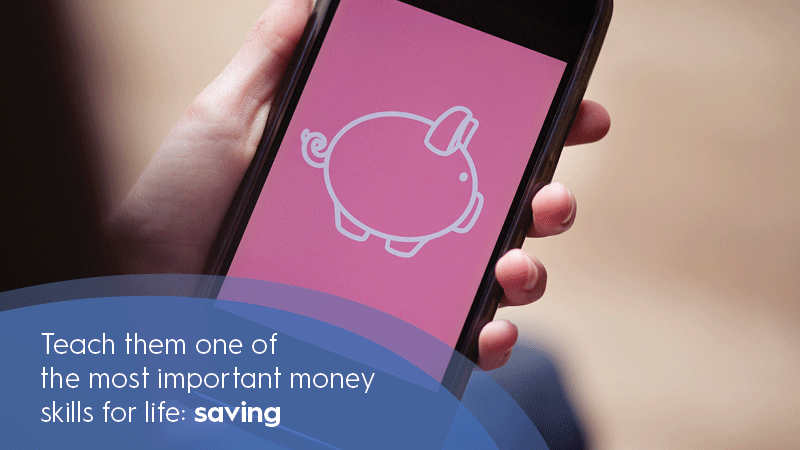The right time to teach kids about saving money might be sooner than you think. The surprising truth is, kids form their money habits very early on. Behaviour experts at Cambridge University1 found children’s money habits are formed by the age of 7.

With that in mind, it’s never too early to start teaching your kids how to make good decisions about money. A good place to start is saving, as it’s a cornerstone of healthy financial habits. The key is to do it in a way that’s fun, engaging and makes sense to them.
Teaching kids to save
A new video game? A pair of sneakers? An iPhone? Most kids have their eye on something, and we can use those ‘wants’ as an opportunity to teach them how to form healthy savings habits for life.
Using these ‘wants’ to set a savings goal is a great way to help children conceptualise the future and learn to save. With your help, the goal setting process can help kids calculate and understand how long it will take before they can afford their goal. Together you can figure out if it will take days, weeks or months to reach the goal, and what they can do to get there faster.
Then, it’s about repeating the process for the next ‘want’. With time and repetition, saving can become second nature.
Here are some tips to get you started:
Write it down - Together, write down what your kids are saving for or use pictures and place it somewhere visible, like the fridge or their bedroom wall.
Crunch the numbers - Help your kids to calculate how long it will likely take to reach their goals, and how much they need to put aside to get there. A shorter timeframe is the way to go for first-time goal setters, because they are more likely to stick to it and feel good about reaching their goal, which should encourage them to set more goals afterwards.
Keep track - Find a way to track progress so it stays front of mind. Regularly talk about how much they’ve saved, and how much more they need to reach their goal. You may like to add weekly updates to the poster, using numbers or stickers.
Provide encouragement - Help them to stay strong! The first savings journey can be tough going for kids, as they haven’t yet experienced the reward at the end and may struggle to understand how long it will take to get there. Keep talking to them and use positive encouragement to keep them going.
Make it fun - Create a sense of fun around the task, especially for younger children.
Use incentives - like matching their savings - and rewards for reaching the target. To keep them on track, you might like to offer bonuses along the way, for example an extra $5 when they save their first $20.
Talk and reflect - Talk to your kids about what you do to save to create a savings culture in your household. Let them know there are trade-offs to reach their goal, like foregoing some of the things they want to buy along the way. Once a goal is reached, reflect on the process together. If the goal isn’t reached, talk about why and be sure to have another go.
Lead by example - Having regular conversations about how you save as well as role-modelling good savings behaviour really helps to encourage kids to become clever with money.
Create a healthy habit

If your child sees the savings process through, they will know it actually works. Chances are, they’ll be enthusiastic about giving it another go once they see a positive result. And like most habits, savings behaviour will strengthen with repetition.
Forming good habits from the get-go is easier than trying to change bad habits later in life2. That’s why it can be so useful to find strategies that help children develop automatic habits which are both to their advantage and fit in with their way of life and sense of self.
Giving kids the opportunity to make some decisions about money themselves can really help to bring this lesson to life. Whether your kids earn their money by doing chores, by working or by receiving pocket money, it’s important to get in the habit of putting some money aside regularly. That way, you’re helping to set your kids up for success in adulthood.
1 https://mascdn.azureedge.net/cms/mas-habit-formation-and-learning-in-young-children-executive-summary.pdf
2 Money Advice Service: Money Lives: The Financial Behaviour of the UK, March 2014
Good money habits for life, download our free eBook

7 ways to start saving this new financial year
18 July 2024 | Super The 2023-24 financial year is now behind us and there’s nothing like closing a chapter to inspire thoughts of a fresh start. Here are some tips to get on top of your finances for 2024-25. Read more
How to maximise your 2024 tax refund
18 July 2024 | Finance 101 With tax time nearly upon us, you might be interested in the following tips, which may help to increase the amount of money you get back. Read more
Super and tax changes that could affect you from 1 July 2024
01 July 2024 | Blog A number of changes to the super and tax system could create opportunities for Australians of all ages. Here’s what’s happening. Read moreImportant information
This information is provided by AMP Life Limited ABN 84 079 300 379 (AMP Life). It is general information only and hasn’t taken your circumstances into account. You should, before making any investment decisions, consider the appropriateness of the information in this article, and seek professional advice, having regard to your objectives, financial situation and needs. Read our Financial Services Guide for information about our services, including the fees and other benefits that AMP companies and their representatives may receive in relation to products and services provided to you.
All information on this website is subject to change without notice. Although the information is from sources considered reliable, AMP does not guarantee that it is accurate or complete. You should not rely upon it and should seek professional advice before making any financial decision. Except where liability under any statute cannot be excluded, AMP does not accept any liability for any resulting loss or damage of the reader or any other person.
The information on this page was current on the date the page was published. As a result of changes to the business from time to time, including changes to product, product issuer, services, trust, trustees and other entities, the information may no longer be current. For up to date information, we refer you to the relevant product disclosure statement and product updates.